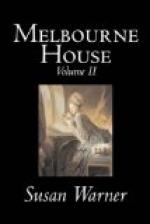“Papa,” said Daisy, her feeling breaking a little through her composure so much as to bring a sort of cry into her voice—“there is joy among the angels of heaven whenever anybody grows good!—”
She had turned to her father as she spoke and threw her arms round his neck, hiding her face, with a clinging action that told somewhat of that which was at work in her mind. Mr. Randolph perhaps guessed at it. He said nothing; he held her close to his breast; and the curtain drew at that moment for the last tableau. Daisy did not see it, and Mr. Randolph did not think of it; though people said it was very good, it was only the head and shoulders of Theresa Stanfield as an old country schoolmistress, seen behind a picture frame, with her uplifted finger and a bundle of rods. Theresa was so transformed that nobody would have known her; and while the company laughed and applauded, Daisy came back to her usual self; and slid out of her father’s arms when the show was over, all ready for supper and Nora Dinwiddie.
There was a grand supper, and everybody was full of pleasure and complimentary speeches and discussion and praise of the tableaux. That was among the elder portion of the company. The four or five children were not disposed to such absolute harmony. Grapes and ices and numberless other good things were well enjoyed, no doubt; but amidst them all a spirit of criticism was rife.
“Daisy, your wings didn’t look a bit like real wings—” said Jane Linwood.
“No,” echoed Nora, “I guess they didn’t. They were like—let me see what they were like! They were like the wings of a windmill.”
“No, they weren’t!” said Ella. “I was in the drawing-room—and they didn’t look like a windmill a bit. They looked queer, but pretty.”
“Queer, but pretty!” repeated Nora.
“Yes, they did,” said Ella. “And you laughed when you were Red Riding-hood, Nora Dinwiddie.”
“I didn’t laugh a bit!”
“It is no matter if you did laugh, Nora,” said Daisy;—“you got grave again, and the picture was very nice.”
“I didn’t laugh!” said Nora; “and if I did, everybody else did. I don’t think the pictures I saw were at all like pictures—they were just like a parcel of people dressed up.”
Some gay paper mottoes made a diversion and stopped the little mouths for a time; and then the people went away.
“Well Daisy,” said Mrs. Gary,—“how do you like this new entertainment?”
“The pictures? I think they were very pretty, aunt Gary.”
“How happened it that somebody else wore my diamonds?” said her mother,—“and not you. I thought you were to be dressed for Queen Esther?”
“Yes, mamma, so I was at first; and then it was thought best—”
“Not by me,” said Preston. “It was no doing of mine. Daisy was to have been Esther, and she herself declared off—backed out of it, and left me to do as best I could.”




